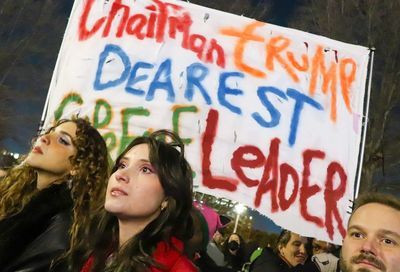Congressional Republicans introduce watered-down “fairness” bill with a host of religious exemptions
Fairness for All Act is being touted as a "compromise" between LGBTQ activists and religious conservatives

Congressional Republicans have introduced a bill aimed at reaching a compromise between prohibiting discrimination against LGBTQ people and respecting the sincerely held religious beliefs of those who believe homosexuality is sinful or wrong.
The “Fairness for All Act,” introduced by U.S. Rep. Chris Stewart (R-Utah) is based on Utah’s nondiscrimination law, which carved out special religious exemptions acceptable to the Church of Jesus Christ of Latter-day Saints while prohibiting blatant forms of discrimination against LGBTQ Utahns. As such, the LDS Church has endorsed the Fairness for All bill, hailing it as an acceptable compromise that will protect religious liberty while providing federal nondiscrimination protections for LGBTQ individuals.
The bill, which has 10 co-sponsors, all Republicans, would amend the Civil Rights Act of 1964 with provisions that explicitly ban anti-LGBTQ discrimination in employment, housing, banking, and places of public accommodations, and would also prohibit discrimination based on sex in public places.
However, the bill would also include a host of exemptions palatable to religious conservatives, including provisions to allow businesses with 15 or fewer employees to discriminate against LGBTQ customers, allow religious corporations to refuse to hire LGBTQ workers, let employees openly raise opinions about marriage in the workplace without fear of reprisal, and create a special mechanism to allow private adoption agencies that refuse to place children with same-sex parents or LGBTQ individuals to continue to receive federal tax dollars.
Stewart told BuzzFeed News that he realizes that some people will be “dissatisfied” with the bill, but believes it can bring about a long-awaited detente on social issues that pro-LGBTQ conservatives, including the Log Cabin Republicans, have previously called for, by negotiating a compromise designed to placate LGBTQ activists and religious conservatives alike.
“I think it’s fair to say that throughout history, there are times when principles come into conflict, and often they are conflicting good principles, both of them of equal value,” Stewart said in a news conference introducing the bill. “The challenge we have before us in our society today is a good example of that, where we have the principle of nondiscrimination, that every American should be treated fairly, and with respect and dignity; and at the same time, the sincerely held belief that religious faith and principles also matter. … There’s enough space for both of those to be accommodated, and that’s what we’ve tried to do here today.”
If passed, the bill’s exemption for small businesses would weaken existing civil rights protections in many states that already have pro-LGBTQ laws on the books, as most of those laws lack the type of carve-outs that Stewart is seeking to implement.
It would also end debate on an issue that remains unresolved in courts — whether wedding-related businesses should have the right to deny goods or services for ceremonies to which they object — by granting broad exemptions for individuals like Jack Phillips, the baker at the Center of the Masterpiece Cakeshop controversy. Already, other religious conservatives have filed pre-emptive lawsuits seeking in order to be able to refuse goods or services for same-sex weddings, such as a case out of Arizona involving two calligraphers making custom-made wedding invitations or another out of Kentucky involving a photographer who does not want to be forced to shoot same-sex weddings.
Under the bill, federally-funded adoption agencies would be barred from turning away prospective parents for being LGBTQ. But it would create an “indirect funding program” in which parents who wish to use a private agency with religious beliefs opposing same-sex marriage and homosexuality can obtain a certificate worth thousands of dollars that the agency could then redeem for federal money.
The bill would also require all public schools to adopt an anti-bullying policy fully protecting LGBTQ students.
Stewart has said that his bill is preferable to waiting for a potentially divisive decision from the U.S. Supreme Court that leaves one side or another angered with the outcome, saying it’s better to “settle this in Congress than in courts” by reaching a permanent solution that would be acceptable to both sides in the debate over LGBTQ rights.
Related: Supreme Court hears arguments in LGBTQ nondiscrimination cases
But hard-line conservatives, such as the Heritage Foundation, have balked at adopting LGBTQ protections into law, arguing that acknowledging legal rights for LGBTQ individuals means that the government had sided against religious individuals by “forcing all Americans to embrace — and live out — certain beliefs about human sexuality.”
Similarly, LGBTQ advocates are less than impressed with the bill’s host of exemptions, arguing that it effectively codifies certain forms of discrimination as acceptable. They say that, if Republicans are so interested in preventing discrimination, they should push Republican senators to pass the Equality Act, which passed the U.S. House of Representatives by a bipartisan vote of 236-173 in May.
A coalition of national advocacy groups, including the American Civil Liberties Union, the Human Rights Campaign, GLAAD, Lambda Legal, The Leadership Conference for Human Rights, the NAACP, the National Black Justice Coalition, and Transgender Law Center, among others, issued a statement opposing the Fairness for All Act and expressing concerns with some of its exemptions.
For example, the equality advocates take issue with the fact that the bill keeps in place all existing protections for race and national origin, without any exemptions for small or religiously-affiliated businesses, but require exemptions for instances involving alleged discrimination based on sex, sexual orientation or gender identity — thereby setting up a two-tiered system of civil rights protections.
“The ‘Fairness for All’ Act is anything but fair, and it certainly does not serve all of us. It is an affront to existing civil rights protections that protect people on the basis of race, sex, and religion and creates new, substandard protections for LGBTQ people with massive loopholes and carve-outs, and upends critical federal programs that serve children in need,” the coalition said in its statement.
Related: Social conservatives proposing “compromise” to weaken Equality Act’s protections
“This legislation would create a ‘double whammy’ for anyone at the intersection of multiple marginalized identities: a Black lesbian or Transgender Jewish woman, for example, could see many of her existing rights erased or rolled back, ostensibly to protect her,” the coalition’s statement continues. “Our nation’s existing civil rights framework already strikes the right balance when it comes to the government’s interest in protecting religious freedom and advancing nondiscrimination, and it is wrong to put into law a different system of protections for LGBTQ people and their families.”
Both Freedom for All Americans and Equality Federation noted the objections to the bill, but expressed optimism to hear conservatives embracing the need for nondiscrimination protections as a good point from which to start.
But Rabbi Jack Moline, the president of the Interfaith Alliance, alleged that the Fairness for All Act betrays the nation’s founding principles.
“Across faith traditions, Americans remain united in the belief that all people deserve equal treatment under the law. In this spirit, the Constitution offers protection to faith communities to exercise their right of belief. However, to allow the private beliefs of any citizen to compromise the rights of other citizens under the law is a violation of the Constitution,” Moline said in a statement.
“So-called carve-outs for religious exemptions in commerce, family definition, medical care or other legal and legally-defined benefits of citizenship are, by any other name, a repudiation of the very principles of equality that are foundational to the United States,” he added. “Once an individual or a society seeks to participate in the public civic life of America, all citizens must be protected from the imposition of beliefs and practices that run counter to the law of the land, which is the law.”
Read more:
LGBTQ activists attack Pete Buttigieg for previously volunteering for the Salvation Army
California inmate sentenced to death for killing his transgender cellmate
Arizona appeals court: Judge was wrong to reject transgender man’s name change
Support Metro Weekly’s Journalism
These are challenging times for news organizations. And yet it’s crucial we stay active and provide vital resources and information to both our local readers and the world. So won’t you please take a moment and consider supporting Metro Weekly with a membership? For as little as $5 a month, you can help ensure Metro Weekly magazine and MetroWeekly.com remain free, viable resources as we provide the best, most diverse, culturally-resonant LGBTQ coverage in both the D.C. region and around the world. Memberships come with exclusive perks and discounts, your own personal digital delivery of each week’s magazine (and an archive), access to our Member's Lounge when it launches this fall, and exclusive members-only items like Metro Weekly Membership Mugs and Tote Bags! Check out all our membership levels here and please join us today!


























You must be logged in to post a comment.